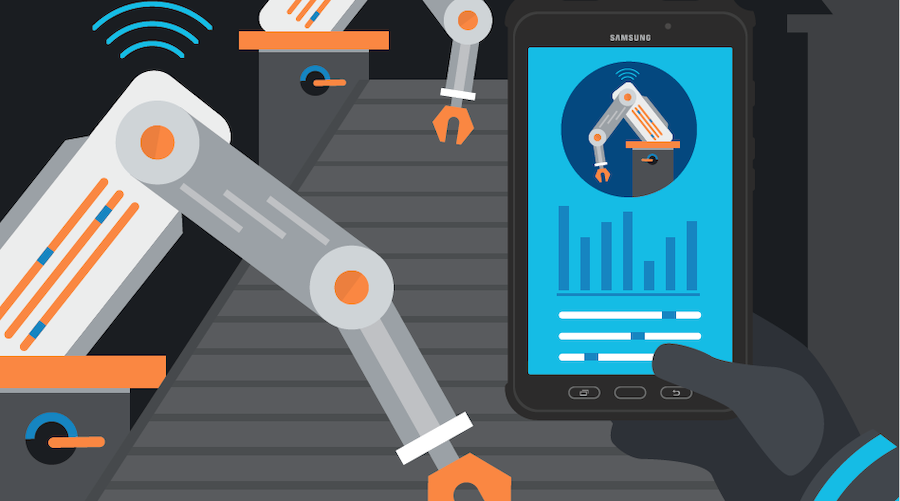Industry 4.0, the next industrial revolution, will be anchored in data. Data drives all smart factory decisions, from inventory reorders to asset management to CRM applications, in an automated loop. Fluidity of data will be key to original equipment manufacturers (OEMs) in Industry 4.0. To support the kind of end-to-end communications that customers expect and to modernize communications with suppliers, OEMs need to add layers of data security to protect the valuable data they send outside the factory walls.
Foundations of Robust Data Security
When data is the fundamental currency for doing business, data security must be reliable. Compromised data can seriously jeopardize manufacturing operations, reduce uptime and even lead to intellectual property theft, thereby threatening the OEM’s competitive advantage. Manufacturing enterprises must focus on cybersecurity and take every precaution to prevent hacking.
Data-intensive manufacturing processes move data across hundreds of thousands of nodes, creating a massive attack surface for hackers. A study by Deloitte and the Manufacturers Alliance for Productivity and Innovation (MAPI) found that one-third of OEMs surveyed had neglected to perform any cyber risk assessments on their industrial control systems (ICSs). Such oversight can be especially disastrous in smart factories, where each Industrial Internet of Things (IIoT)-embedded device introduces a new gateway to compromised data.
Implementing Data Hygiene
There are two essential conduits in Industry 4.0 that need prioritized protection: the Digital Supply Network (DSN) and the smart factory itself, with its array of embedded devices and data processors.
Modernize Your Factory With Mobile
Get your free guide to the mobile technologies that will accelerate your smart factory journey. Download Now
The DSN has replaced the traditional linear supply chain in today’s smart factories. Data from ecosystem partners, including vendors and customers, is shared to create an optimal autonomous loop of production. Any connected device that shares data is a potential vulnerability that needs inspection.
In addition, today’s smart factory, which delivers uptime efficiencies largely through automation of all shop floor processes, can be vulnerable. Any device connected to the Enterprise Resource Planning (ERP) system, whether it’s used on the plant floor or by a third-party vendor, can be compromised.
Data Security Solutions
Fortunately, there are plenty of solutions to ensure sound data hygiene and a robust defense against cyberattacks. The best enterprises apply security in layers, so that a compromise of one layer does not grant cyberthieves full access to the enterprise. Layers typically include physical measures such as endpoint protection, detection software and mitigation measures for eradicating a detected threat. These layers are supported by a threat intelligence feed operated by a worldwide security company or consortium that tracks emerging threats and enables enterprises to detect attacks and successful penetrations.
With the advent of edge processing and fog computing, where data is processed close to the source to decrease latency, mobile devices have come under the microscope. With their propensity to download apps and data from the internet, they can be compromised by cyberthieves. As manufacturers mobilize processes and introduce more mobile devices, they need to choose devices with advanced security features that match or exceed the security of fixed endpoints.
With Samsung phones and tablets, device security is built from the chip up on the Samsung Knox security platform. The defense-grade protection relies on a robust security stack that thwarts would-be data thieves at every turn. Manufacturing data is secured on the phone by real-time kernel protection and proprietary security enhancements that control data access. Newer Samsung devices like the Galaxy Note9 provide multiple biometric authentication modes, including face recognition, which satisfies strict anti-spoofing requirements. Samsung Knox also enables remote wiping of devices in the event they are lost or stolen.
Samsung Knox for Enterprise allows for easy containerization of work and personal data so plant personnel can use one phone for both, while ensuring that all work-related projects are subjected to the highest levels of encryption.
Manufacturers should also deploy mobile device management (MDM) or enterprise mobility management (EMM) solutions that facilitate the enforcement of strict password controls and ensure that the latest operating systems are installed. OS updates are essential to thwart hackers, who target vulnerabilities in unpatched devices with malware. A device management solution also enables application whitelisting and blocklisting, which prevents employees from downloading unapproved applications to their devices.
Lean manufacturing and smart factories hinge on the free flow of data to drive the production floor and the digital supply network. Working with secure mobile devices ensures that the edge computing necessary for many automated processes can be conducted without compromising data integrity.
Learn more about using mobile technology to modernize your factory with our free white paper.









